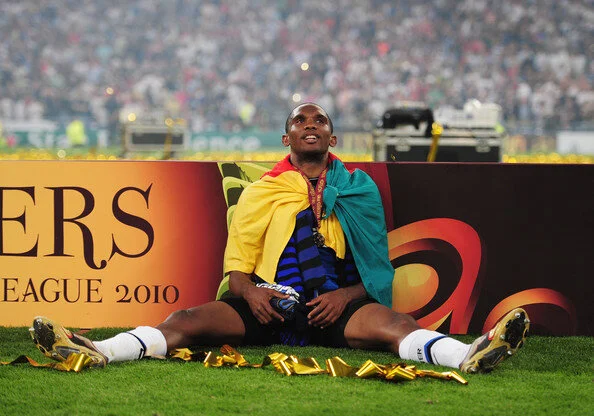Samuel Eto’o: The Indomitable Lion
Winning the African player of the year award four times, the Africa Cup of Nations twice, the UEFA champions league three times, an Olympic gold medal and a number of league titles at Barcelona and Inter Milan, Samuel Eto’o is arguably the greatest African footballer of all time and one of the most formidable strikers of his generation. His career wasn’t short of success, but he made an impact off the football pitch. Eto’o once said he wants to be remembered as someone who helped in the fight against racism; an issue he encountered on many occasions over the course of his career. Being charismatic in nature and having self worth and pride in being black, he was fueled to fight for justice and racial equality, which earned him an award in 2015 for anti racism by the European Council on Tolerance and ReconcilIation (ECTR).
Eto’o was born in Nkon, Cameroon, and his football career began at the Kadji Sports Academy in Douala, Cameroon. He was an early bloomer, making his debut for the Cameroon national team aged 15, joining Real Madrid when he was 16 and being the youngest player at the France 98 World Cup aged 17 years and 3 months. He was sent on loan by Real Madrid to Leganes and Espanyol before eventually signing a permanent deal with Mallorca in 2000. He became their top scorer of all time and helped them win the Spanish Copa Del Rey in 2003.
Eto'o joined Barcelona in 2004, scoring 24 goals in his first season which were instrumental in winning them the La Liga title. The incidents of racial abuse which Eto’o experienced during his football career included monkey chants and bananas being thrown in his direction. This once made him prevent his family from attending his games. One of these incidents occurred during the La Liga match between Barcelona and Real Zaragoza in 2005 when the opposition's fans made monkey noises whenever Eto’o touched the ball. To protest and ensure his message was received by the people who made these chants, he scored and danced like a monkey in Barcelona’s 4-1 win. The chants continued when the two teams met a year later, and on this occasion he’d had enough. Eto’o grabbed the hand of Zaragoza’s player, Alvaro to point out the fact he was also black to the fans. He then attempted to walk off the pitch saying he couldn’t carry on while being racially abused in the stadium. He was eventually persuaded by the referee, his teammates and the Zaragoza players to keep playing, and both Barcelona goals scored in the 2-0 win were celebrated in support of their teammate. The Spanish Football Federation only fined Real Zaragoza £6,000, a decision Eto’o described as pathetic.
He never shied away from speaking out and protesting like he did when he danced against Zaragoza, and once saying he had to deal with racism so often that he found ways to make a point. Another example being when he scored against Real Madrid and held his fist in a Black Power Salute. When he moved to Italy and joined Inter Milan, the incidents of racism he had faced in Spain continued. Inter faced Cagliari in a Seria A match in 2010, and the referee paused the game and informed the stadium announcer to inform the fans of the possibility of abandoning the game if it continued. Eto'o got the last laugh, scoring the only goal of the match and again making his point by imitating a monkey in his goal celebration. Although Cagliari were later fined £22,000 pounds, their manager at the time, Pierpaolo Bisoli, suggested it was a misunderstanding over the nature of the boos.
He retired from international football in 2014 as Cameroon’s record scorer with 56 goals in 118 games, and his football retirement came five years later, achieving legendary status in Europe while also standing up to racism. In 2005, he had called on leaders, white footballers and journalists to participate in this fight, and show support that will lead to significant change. He discussed the struggles he faced as an African, where he felt he needed to do more than others to be recognised at the same level. He also pointed out the fact racism in Spanish football had escalated so much that appointing a black referee was likely to upset the fans. A lack of black representation in referees observed in Europe proves his point even today.
Eto’o is also known for his philanthropic work, and he runs a foundation to improve development in Cameroon with a focus on health, sports, education, community development and support for cultural activities. Some of the work he has done includes donating ambulances to the health sector, setting up scholarship programs and also creating football academies.
As the world protests racism and police brutality against black people, there is also a focus on the topic in football. The restart of the premier league on June 17 saw all 22 players including the officials taking a knee, and the players wearing ‘Black Lives Matter’ on the back of their shirts in support of the message. This is a good start, but more needs to be done to really tackle this issue in football. Efforts need to be made to increase black representation in the Football Association board, referees, coaching staff and also in the media which creates equality in decision making, promotes education and prevents racial bias in the system. Penalties for cases of racism in the stadium also should have harsh consequences such as points deduction, heavy fines and longer bans. Players and referees should be given more power if they decide a game should be paused or suspended due to racist abuse.
Just as Samuel Eto’o chose to stand for something bigger than him, we have a duty to get rid of racism and stand for equality.




